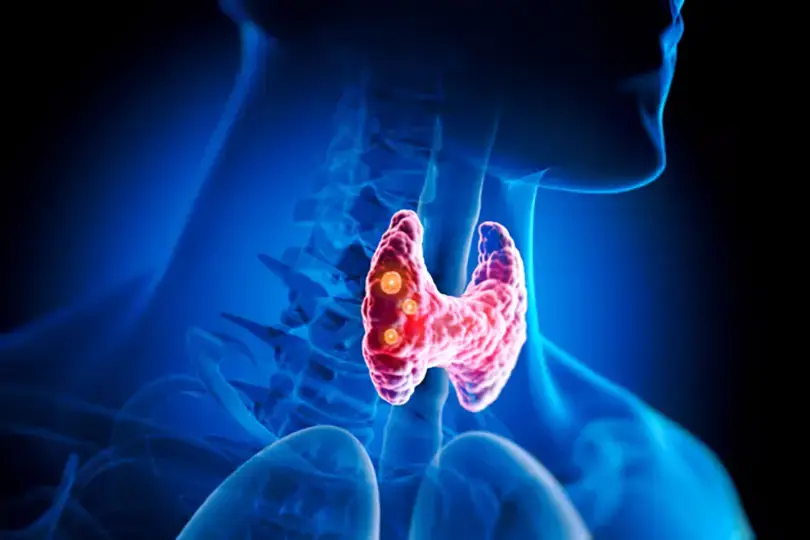Hello, friends! Today, I want to talk about something that often stays behind the scenes of our overall health — the thyroid gland.
This small organ located at the front of your neck weighs just about 25 grams, yet it influences almost every process in your body — from energy levels and metabolism to mood, body temperature, and even your ability to concentrate.
In California, where the pace of life is fast, stress is constant, and diets often lean toward fast food or plant-based meals that lack sufficient iodine, thyroid problems are becoming increasingly common. According to the American Association of Clinical Endocrinologists, about 12% of Americans will develop a thyroid disorder at some point in their lives — and many don’t even know it.
🔹 What the Thyroid Does
The thyroid gland produces two key hormones — T3 (triiodothyronine) and T4 (thyroxine). Think of them as your body’s “gas pedal.” They determine how quickly your cells work, how efficiently calories are burned, how body temperature is maintained, and how your heart, brain, and nervous system function.
These hormones are regulated by the pituitary gland, the brain’s command center, which releases thyroid-stimulating hormone (TSH).
When the thyroid slows down, TSH levels rise to push it into action. When there’s too much thyroid hormone, TSH levels drop.


🔹 The Two Main Types of Thyroid Disorders
1. Hypothyroidism — When the Thyroid Slows Down
The body seems to “run in slow motion.”
Common symptoms include:
- Fatigue and sleepiness even after a full night’s rest
- Weight gain without overeating
- Sensitivity to cold, dry skin, brittle hair and nails
- Puffy face, hoarse voice
- Poor concentration, apathy, depression
In California, autoimmune thyroiditis (Hashimoto’s disease) is quite common — a condition in which the immune system mistakenly attacks the thyroid’s own cells.
2. Hyperthyroidism — When the Thyroid Speeds Up
Here, everything happens too fast:
- Rapid heartbeat, tremors, sweating
- Weight loss despite a good appetite
- Irritability, anxiety, insomnia
- Elevated body temperature, muscle weakness
One of the most common causes is Graves’ disease — another autoimmune disorder that overstimulates the thyroid.
🔹 Why It’s Important to Check Your Thyroid
The thyroid affects far more than just metabolism. It plays a key role in heart health, reproductive function, and even mental well-being.
Many patients spend years treating depression, anxiety, or chronic fatigue without realizing the root cause lies in their endocrine system.
It’s especially important to monitor your thyroid if you are:
- A woman over 35
- Pregnant or planning to become pregnant
- Living with an autoimmune condition (like type 1 diabetes or celiac disease)
- Living in an area with iodine deficiency or chronic stress
🔹 Symptoms You Should Never Ignore
If you notice several of the following symptoms, it’s worth seeing a doctor and getting tested:
- Constant fatigue or lack of energy
- Unexplained weight changes
- Sensitivity to cold or heat
- Sleep problems, anxiety, irritability
- Hair loss, dry skin
- Memory issues, difficulty focusing
- Irregular menstrual cycles (in women)
- Rapid heartbeat, pressure or tightness in the neck

🔹 How to Support Your Thyroid Health
1. Maintain Healthy Iodine Levels
Iodine is essential for producing thyroid hormones. Its deficiency can lead to hypothyroidism.
Sources include salmon, cod, tuna, shrimp, seaweed, iodized salt, eggs, and dairy products.
2. Don’t Overdo Soy or Cruciferous Vegetables
Broccoli, cabbage, and soy contain compounds that can interfere with iodine absorption when consumed in large quantities. For most healthy people, this isn’t an issue — but for those with thyroid conditions, moderation is key.
3. Manage Chronic Stress
Cortisol, the stress hormone, suppresses thyroid hormone production. Relaxation techniques, yoga, walking, and adequate sleep are some of the best ways to protect your endocrine system.
4. Never Self-Medicate with Hormones or Supplements
Trying to “boost” your thyroid on your own can lead to serious complications — from arrhythmia to thyrotoxicosis.
5. Get Regular Screenings
Even if you feel fine, testing your TSH once a year is a smart preventive step, especially after age 35.
🔹 Women’s Health and the Thyroid
Women are five to eight times more likely than men to experience thyroid disorders.
Thyroid hormones directly influence menstrual cycles, fertility, and pregnancy.
With hypothyroidism, ovulation can become irregular, leading to infertility and pregnancy complications.
With hyperthyroidism, women may experience weight loss, anxiety, and cycle disruptions.
During pregnancy, thyroid function is critical — maternal hormones help a baby’s brain develop during the first months of life. That’s why testing TSH is essential when planning pregnancy.
🔹 The California Lifestyle Factor
Life in California is sunny and vibrant — but it’s also stressful. Long commutes, skipping breakfast, too much coffee, lack of sleep, and sedentary work can all disrupt hormonal balance.
Many Californians follow plant-based diets that are low in iodine and selenium — two key minerals for thyroid health.
Selenium, found in Brazil nuts, salmon, eggs, and whole grains, helps protect the thyroid from oxidative stress.
Add to that chronic tension and late-night screen time — and it’s no surprise that local doctors are seeing more cases of subclinical hypothyroidism, even among young and active people.
🔹 Can the Thyroid Be Restored?
Yes. With timely diagnosis, most thyroid disorders are manageable.
Depending on the condition, your doctor may recommend:
- Hormone replacement therapy (for hypothyroidism)
- Medications to reduce hormone production (for hyperthyroidism)
- Dietary changes and regular monitoring (for autoimmune conditions)
📌 Remember: this isn’t a sentence — it’s your body’s way of asking for attention and balance.
5 Common Thyroid Myths — Debunked
Despite being well-studied, thyroid diseases are surrounded by myths. Let’s clear up the most common ones.
🧩 Myth 1: “If I feel fine, I don’t need to get tested.”
In early stages, thyroid issues may show no symptoms at all.
The gland can quietly compensate for dysfunction for years.
That’s why annual TSH testing is the best way to catch a problem before it shows up.
☕ Myth 2: “Hypothyroidism just means I’m tired.”
No. When your thyroid slows down, every process in your body slows down — metabolism, heart rate, brain function, liver activity.
It’s not just “fatigue”; it’s a metabolic slowdown that can lead to complications like high cholesterol and heart rhythm problems if untreated.
🧂 Myth 3: “Iodized salt keeps your thyroid healthy.”
Iodine is important, but it’s not the whole story.
If your thyroid issue stems from an autoimmune process or hormonal imbalance, extra iodine could actually make things worse.
Always test TSH, T4, and antibodies before taking supplements.
💊 Myth 4: “Thyroid medications make your gland lazy.”
This is one of the most harmful misconceptions.
Modern thyroid hormone replacements don’t “shut down” the gland — they simply provide your body with what it can’t make on its own.
Properly adjusted doses restore energy, focus, and quality of life without dependency.
🧘 Myth 5: “Thyroid diseases are incurable.”
Most thyroid conditions are manageable.
Hypothyroidism, hyperthyroidism, and autoimmune thyroiditis can all be effectively controlled.
With the right diagnosis, treatment, balanced nutrition, and stress management, you can live a full, healthy life.
The thyroid may be small, but it carries a massive responsibility. It reacts to everything — what you eat, how you feel, how you rest, and how you handle stress. In today’s fast-paced world, it’s often the first organ to “take the hit.”
So if you feel low on energy, emotionally unstable, or just “not yourself,” don’t rush to blame fatigue — your thyroid might simply be asking for care.
Take care of yourself and your thyroid — it works for you 24/7 💙






